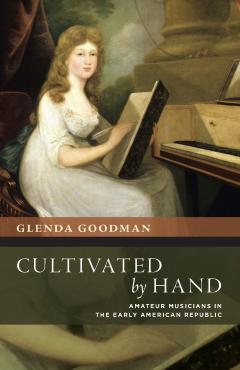I am a historian of music who specializes in American music of the seventeenth and eighteenth centuries. My avenues of inquiry include the material culture of music and book history, amateur music-making and gender, and soundscapes of colonialism. My first book, Cultivated by Hand: Amateur Musicians in the Early American Republic, brings together the history of gender, books, and labor to explore the little-known world of amateur music-making by women and men in the first generation after the American Revolution. I'm honored that my book won the Lewis Lockwood Book Award from the American Musicological Society in 2021, and that my article, "Bound Together: The Intimacies of Music Book Collecting in the Early American Republic," received the AMS's Alfred Einstein Article Award that same year. I am currently working on a book about Protestant sacred music and settler colonialism in the eighteenth century. This project explores the territorializing role of music and sound, as well as the adoption and adaptation of hymnody by Native Americans (primarily Haudenosaunee Six Nations and Southern New England Algonquian-language group speakers). The first fruits of this research can be seen in my article on the lost music manuscript books of Joseph Johnson (a Mohegan Christian), which appeared in the Journal of the Society for American Music’s special issue on “Settler Sounds: Music, Indigeneity, and Colonialism in the Americas” (Fall 2019). My other articles have appeared in the Journal of the American Musicological Society, the Journal of the Society for American Music, the William and Mary Quarterly, Eighteenth-Century Studies, and the Journal of the Royal Musical Association, and edited collections.
Interdisciplinary collaboration is important to me. I am co-editor of an interdisciplinary volume on book history in the Americas, American Contact: Objects of Intercultural Encounters and the Boundaries of Book History and I am also co-convenor of a colloquy, “Early American Music and the Construction of Race,” published in the Journal of the American Musicological Society (Fall 2021). Both of these projects are collaborations with cultural historian Rhae Lynn Barnes. Dr. Barnes and I are in the early stages of a new project on printed music notation, epistemology, and imperialism in the long nineteenth century tentatively titled Notating Empire: Printed Music and the Frontiers of Knowledge.
I teach courses on American music, women and music, popular music, and methods for the study of music history. My graduate seminars address topics in eighteenth-century studies, such as music and revolution, sacred music and settler colonialism; and methods/materials courses on music and book history, and archive studies. Undergraduate courses I offer include surveys of US and popular music, specialized courses on amateurism and expertise, and a course in environmental humanities on birding and sound. My approach to teaching and scholarship is fundamentally interdisciplinary. By training and inclination, I am very much a historian; I also have a background as a performer (I studied viola at Oberlin and Juilliard, where I played mostly experimental and contemporary music).
American Contact: Objects of Intercultural Encounters and the Boundaries of Book History (University of Pennsylvania Press, 2024), co-edited with Rhae Lynn Barnes
Cultivated by Hand: Amateur Musicians in the Early American Republic (Oxford University Press, 2020)
“Finding the ‘Frontier’ in a Page of Music: Imperial Evidence and the Legacy of Settler Colonialism,” with Rhae Lynn Barnes, American Music: 40th anniversary special issue, Summer 2023
“American Music and Racial Fantasy, Past and Present,” with Rhae Lynn Barnes, in colloquy "Early American Music and the Construction of Race," convened by Barnes and Goodman, Journal of the American Musicological Society (Fall 2021)
“Land and Conversion: New Frameworks for Colonial Hymnody,” in Theatres of Belief: Music and Conversion in the Early Modern City, Iain Fenlon, Marie-Alexis Colin, and Matthew Laube, eds.(Turnhout, Belgium: Epitome Musical Series of Brepols Pub., 2021)
With Sam Parler, “White Noise: Historiographical Exceptionalism and the Construction of a White American Music History,” in Sounding Together: Collaborative Perspectives on U.S. Music in the 21st Century, Charles Hiroshi Garrett and Carol Oja, eds. (Ann Arbor: University of Michigan Press, 2021)
“‘Hideous Acclamations’: Captive Colonists, Forced Singing, and the Incorporation Imperatives of Mohawk Listeners,” in Acoustemologies in Contact: Sounding Subjects and Modes of Listening in Early Modernity, Emily Wilbourne and Suzanne G. Cusick eds. (Cambridge, UK: Open Book Publishers, 2021)
“Bound Together: The Intimacies of Music Book Collecting in the Early American Republic,” Journal of the Royal Musical Association (Fall 2020)
“Conditioned Ears: How to Listen to Mohican-Moravian Hymnody,” in a Forum in the William and Mary Quarterly (Summer 2020)
“Joseph Johnson’s Lost Gamuts: Native Hymnody, Materials of Exchange, and the Colonialist Archive,” Journal of the Society for American Music special Issue on Indigeneity and Colonialism, edited by Gabriel Solis and Jessica Bissett Perea (Fall 2019)
“Sounds Heard, Meaning Deferred: Music Transcription as Imperial Technology,” Eighteenth-Century Studies Vol. 52, No. 1, Special Issue: Empires in the Eighteenth Century (Fall 2018)
“Transatlantic Contrafacta, Musical Formats, and the Creation of Political Culture in Revolutionary America,” Journal of the Society for American Music Vol. 11, no. 4 (Fall 2017)
“The ‘Swinish Multitude’ come to America: Political Song and Transatlantic Print in the Age of Revolution.” The Oxford Handbook of Protest Music, Eric Drott and Noriko Manabe, eds.
“Land and Conversion: New Frameworks for Colonial Hymnody,” in Crossing Boundaries: Music and Conversion in the Early Modern City, Fenlon, Marie-Alexis Colin, and Matthew Laube, eds. (Turnhout, Belgium: Epitome Musical Series of Brepols Pub.)
“‘Hideous Acclamations’: Captive Colonists, Forced Singing, and the Incorporation Imperatives of Mohawk Listeners,” in Sound, Music, and Alterities in Early Modernity, Suzanne Cusick and Emily Wilbourne, eds. (Cambridge, UK: Open Book Publishers, forthcoming)
“The Power to Please: Gender and Celebrity Self-Commodification in the Early American Republic.” Consuming Music: Individuals, Institutions, Communities, 1730-1830, Emily Green and Catherine Mayes, eds. (University of Rochester Press, 2017), pp. 176-202
“Transatlantic Music Studies.” In Oxford Handbooks Online, Oxford University Press (2015)
“Musical Sleuthing in Early America: ‘Derry Down’ and the XYZ Affair.” Common-Place, Special Issue on Music, Vol. 13, No. 2 (2013)
“‘The Tears I Shed at the Songs of Thy Church’: Seventeenth-Century Musical Piety in the English Atlantic World.” Journal of the American Musicological Society Vol. 65., No. 3 (Fall 2012)
“‘But they differ from us in sound’: Indian Psalmody and the Soundscape of Colonialism, 1651-75.” William and Mary Quarterly, 3rd ser., Vol. 69., No. 4 (Fall 2012)

